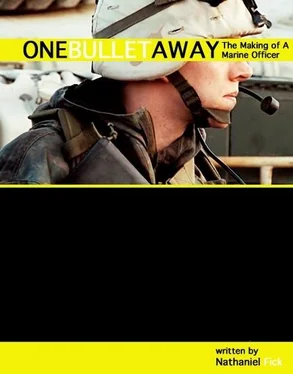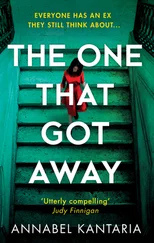Nathaniel Fick
ONE BULLET AWAY
The Making of a Marine Officer
TO
CAPTAIN BRENT MOREL
Bravo Company, First Reconnaissance Battalion, First Marine Division. Killed in Action 7 April 2004, Al Anbar Province, Iraq
AND
THE BRAVE MOTHERS
OF UNITED STATES MARINES
We should remember that one man is much the same as another, and that he is best who is trained in the severest school.
— THUCYDIDES
FIFTEEN OF US climbed aboard the ancient white school bus. Wire mesh covered its windows and four black words ran along its sides: UNITED STATES MARINE CORPS. Dressed casually in shorts and sandals, we spread out and sat alone with our bags. Some sipped coffee from paper cups, and a few unfolded newspapers they had brought. I found a seat near the back as the bus started with a roar and a cloud of smoke blew through the open windows.
A second lieutenant, looking crisp in his gabardine and khaki uniform, sat in the front row. He had just graduated from Officer Candidates School, and would escort us on the hour’s drive to the Marine Corps base in Quantico, Virginia. Shortly after we pulled away from the recruiting office, he stood in the aisle and turned to face us. I expected a welcome, a joke, some commiseration.
“Honor, courage, and commitment are the Marines’ core values,” the lieutenant shouted over the engine. He sounded scripted, but also sincere. “If you can’t be honest at OCS, how can the Corps trust you to lead men in combat?”
Combat. I glanced around the bus’s gunmetal interior, surprised to see people reading or pretending to sleep. No one answered the lieutenant’s question. He stood there in the aisle, glaring at us, and I sat up a little straighter. The lieutenant was my age, but he looked different. Shorter hair, of course, and broader shoulders. It was more than that. He had an edge, something in his jaw or his brow that made me self-conscious.
I turned toward the window to avoid his gaze. Families drove next to us, on their way to the lake or the beach. Kids wearing headphones gawked, surely wondering what losers were riding a school bus in the summertime. A girl in an open Jeep stood and started to raise her shirt before being pulled back down by a laughing friend. They waved and accelerated past. I thought of my friends, spending their summer vacations in New York and San Francisco, working in air-conditioned office towers and partying at night. Staring through the wire mesh at the bright day, I thought this must be what it’s like on the ride to Sing Sing. I wondered why I was on that bus.
I went to Dartmouth intending to go to med school. Failing a chemistry class had inspired my love of history, and I ended up majoring in the classics. By the summer of 1998, my classmates were signing six-figure contracts as consultants and investment bankers. I didn’t understand what we, at age twenty-two, could possibly be consulted about. Others headed off to law school or medical school for a few more years of reading instead of living. None of it appealed to me. I wanted to go on a great adventure, to prove myself, to serve my country. I wanted to do something so hard that no one could ever talk shit to me. In Athens or Sparta, my decision would have been easy. I felt as if I had been born too late. There was no longer a place in the world for a young man who wanted to wear armor and slay dragons.
Dartmouth encouraged deviation from the trampled path, but only to join organizations like the Peace Corps or Teach for America. I wanted something more transformative. Something that might kill me — or leave me better, stronger, more capable. I wanted to be a warrior.
My family had only a short martial tradition. My maternal grandfather, like many in his generation, had served in World War II. He was a Navy officer in the South Pacific, and his ship, the escort carrier Natoma Bay , fought at New Guinea, Leyte Gulf, Iwo Jima, and Okinawa, often supporting Marine invasion forces ashore. At 0635 on June 7, 1945, so the family story went, only two months before the end of the war, a Japanese kamikaze crashed into the Natoma Bay ’s flight deck. The explosion tore a hole in the steel twelve feet wide and twenty feet long. Shrapnel peppered my grandfather’s body. My mother remembers watching him pick pieces of metal from his skin twenty years later. He had some of that shrapnel melted into a lucky horseshoe, which was shown to me with great reverence when I was a child.
My father enlisted in the Army in 1968. When most of his basic training class went to Vietnam, he received orders to the Army Security Agency. He spent a year in Bad Aibling, Germany, eavesdropping on Eastern bloc radio transmissions and waiting for the Soviets to roll through the Fulda Gap. He completed OCS just as President Richard Nixon began drawing down the military, and took advantage of an early out to go to law school. But my dad was proud to have been a soldier.
The Army sent me a letter during my junior year at Dartmouth, promising to pay for graduate school. The Navy and Air Force did the same, promising skills and special training. The Marine Corps promised nothing. Whereas the other services listed their benefits, the Corps asked, “Do you have what it takes?” If I was going to serve in the military, I would be a Marine.
A few months before, I’d seen a poster in the dining hall advertising a talk by Tom Ricks. Then the Wall Street Journal ’s Pentagon correspondent, Ricks had recently written a book about the Marines. I sat up most of one night reading it. I arrived early to get a good seat and listened as Ricks explained the Corps’s culture and the state of civil-military relations in the United States. His review of the Marines, or at least my interpretation of it, was glowing. The Marine Corps was a last bastion of honor in society, a place where young Americans learned to work as a team, to trust one another and themselves, and to sacrifice for a principle. Hearing it from a recruiter, I would have been skeptical. But here was a journalist, an impartial observer.
The crowd was the usual mix of students, faculty, and retired alumni. After the talk, a young professor stood. “How can you support the presence of ROTC at a place like Dartmouth?” she asked. “It will militarize the campus and threaten our culture of tolerance.”
“Wrong,” replied Ricks. “It will liberalize the military.” He explained that in a democracy, the military should be representative of the people. It should reflect the best of American society, not stand apart from it. Ricks used words such as “duty” and “honor” without cynicism, something I’d not often heard at Dartmouth.
His answer clinched my decision to apply for a slot at Marine OCS during the summer between my junior and senior years of college. I would have laughed at the idea of joining the Corps on a bet or because of a movie, but my own choice was almost equally capricious. Although I had reached the decision largely on my own, Tom Ricks, in an hour-long talk on a cold night at Dartmouth, finally convinced me to be a Marine.
But even joining the Marines didn’t seem as crazy as it had to my parents’ generation. This was 1998, not 1968. The United States was cashing in its post-cold war peace dividend. Scholars talked about “the end of history,” free markets spreading prosperity throughout the world, and the death of ideology. I would be joining a peacetime military. At least that’s the rationale I used when I broke the news to my parents. They were surprised but supportive. “The Marines,” my dad said, “will teach you everything I love you too much to teach you.”
Читать дальше












